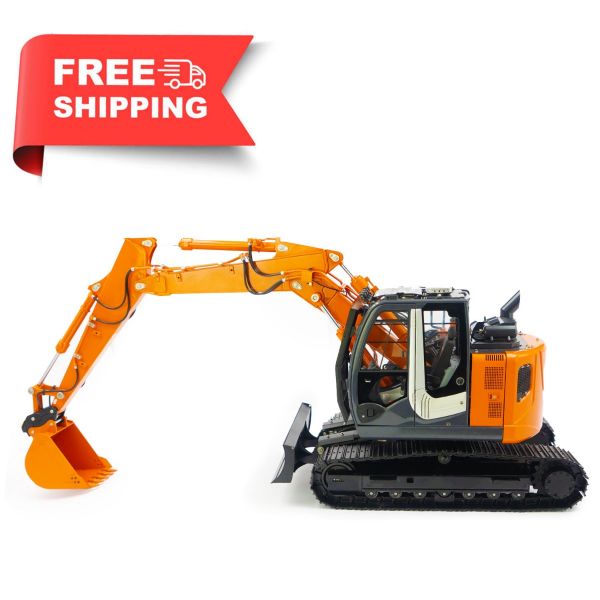Understanding Just How Excavator Works and Its Influence On Effectiveness
Excavators play a crucial duty in building and construction and mining operations, relying upon a complex interaction of hydraulic and mechanical systems. Their capacity to do a range of tasks rests on both their style and the innovation integrated within. Understanding these components can significantly impact functional effectiveness and efficiency. As developments continue to improve the market, one need to take into consideration just how these adjustments will influence future methods and efficiency.
The Basics of Excavator Mechanics

The Function of Hydraulic Equipments in Excavators
At the heart of excavator operation lies the hydraulic system, which plays a critical function in powering the maker's activities and features. This system uses pressurized hydraulic fluid to transfer energy, allowing numerous activities such as swinging, lifting, and digging. By harnessing the principles of hydraulics, excavators can do tasks with amazing precision and pressure, boosting total operational efficiency.The hydraulic system includes crucial parts, consisting of pumps, cyndrical tubes, and shutoffs, which interact to manage the flow and direction of the fluid. When the operator involves the controls, the hydraulic liquid is routed to details cyndrical tubes, translating the operator's commands into physical activity. This mechanism enables smooth and responsive actions, which are necessary in building and excavation atmospheres. double e volvo rc excavator. The effectiveness of the hydraulic system directly impacts the productivity and adaptability of the excavator, making it an important aspect in contemporary excavation procedures
Trick Elements of an Excavator
Recognizing the crucial elements of an excavator is vital for understanding how this effective equipment operates. An excavator contains a number of significant aspects, including the undercarriage, home, boom, arm, and bucket. The undercarriage supplies stability and flexibility, commonly featuring wheels or tracks to navigate numerous terrains. Your home includes the engine and hydraulic systems, allowing the operator to regulate motion and power the machine. The boom expands from the home, enabling upright reach, while the arm connects to the bucket, assisting in digging and training operations.Additionally, the cab houses the driver, furnished with controls for accurate maneuvering. Each of these elements plays an important duty in the excavator's overall capability, adding to its performance and effectiveness on building and construction sites. Understanding these parts aids in maintaining and maximizing excavator performance, making sure tasks are completed safely and successfully.
Add-on Adaptability and Its Advantages
Attachment adaptability is an important aspect of excavators, making it possible for operators to change in between different tools tailored for particular jobs. This adaptability not only boosts task effectiveness yet additionally adds to cost-effectiveness by reducing the demand for numerous makers. Recognizing the various kinds of add-ons offered can significantly impact the total performance and capability of an excavator on work sites.
Sorts of Accessories
While excavators are primarily recognized for their digging capacities, their true flexibility depends on the wide array of accessories available. These add-ons improve the excavator's capability, enabling it to perform different tasks beyond excavation. Typical attachments include containers (for digging and scooping), hydraulic thumbs (for understanding materials), and augers (for drilling openings) Grapples are made use of for moving and dealing with debris, while rippers can damage up difficult surfaces. Various other specialized accessories, such as trenchers and rakes, allow excavators to adjust to particular job demands. This variety not just increases the device's energy across various markets, including building, demolition, and landscaping, yet also allows operators to customize their devices to fulfill particular task needs successfully.
Boosted Work Performance
Maximizing task efficiency is a key advantage of making use of various excavator accessories. Various attachments allow an excavator to perform numerous jobs without needing to switch equipment, saving useful time and labor. Using a hydraulic hammer can damage concrete while a container add-on can excavate dirt, enabling a seamless workflow. This adaptability decreases downtime connected with devices changes and boosts productivity on-site. Additionally, specialized attachments enhance accuracy in jobs such as grading or landscaping, leading to greater quality results. The capability to adjust to various task needs not just improves operations but also lessens the need for additional machinery, ensuring that tasks are finished quickly and efficiently. Generally, attachment flexibility substantially adds to raised work performance in excavation work.
Cost-Effectiveness and Flexibility
Cost-effectiveness is a substantial benefit of utilizing versatile excavator attachments. These add-ons permit a single excavator to this website do multiple tasks, lowering the requirement for added machinery and labor - double e volvo rc excavator. By changing between containers, hammers, and grapples, operators can tackle various jobs, from digging to demolition, thereby making best use of equipment use. This versatility not only decreases operational costs but also minimizes downtime linked with transforming devices. Furthermore, the capability to customize excavators with specialized attachments improves productivity, as they can efficiently take care of varied tasks according to task needs. In conclusion, the combination of cost-effectiveness and flexibility in excavator add-ons contributes to enhanced operational effectiveness and resource allowance in building and excavation tasks

Advanced Modern Technology in Modern Excavators
Modern excavators are progressively geared up with sophisticated technology that changes excavation procedures. Automation improves operations, while boosted gas effectiveness decreases functional expenses. Additionally, smart control systems boost precision and safety, noting a considerable development in excavation devices.
Automation in Excavation Processes
As excavation technology advances, automation has arised as an essential element in enhancing effectiveness and precision on job websites. Modern excavators are geared up with innovative automated systems that help with jobs such as grading, digging, and trenching with marginal operator treatment. These systems utilize sensors, GPS, and artificial intelligence formulas to guarantee accurate placing and depth control, significantly reducing the margin for error. Furthermore, automation allows operators to concentrate on calculated decision-making rather than manual controls, leading to improved performance in general. Such technologies not just improve process yet also boost security by minimizing human mistake in complex procedures. The combination of automation in excavation processes represents a substantial improvement in building and construction modern technology, driving the sector in the direction of greater efficiency and performance.
Enhanced Gas Performance
Innovations in technology have actually additionally led to considerable enhancements in fuel performance for contemporary excavators. Modern devices are furnished with advanced engines that optimize power outcome while reducing gas intake. These engines utilize cutting-edge burning modern technologies, such as turbocharging and straight gas shot, to boost performance and effectiveness. Additionally, light-weight products in building and construction lower general weight, allowing for less energy expenditure throughout operation. The introduction of variable rate controls enables drivers to change engine efficiency according to details tasks, further reducing gas use. Therefore, these improvements not only reduced operational expenses yet also add to environmental sustainability by lowering exhausts. On the whole, enhanced gas effectiveness in excavators is a vital growth that strengthens performance and financial stability in the construction sector.
Smart Control Solution
While operators navigate progressively intricate job websites, clever control systems in excavators have become essential tools for enhancing effectiveness and accuracy. These sophisticated innovations make use of algorithms and sensing units to check numerous parameters such as tons weight, surface problems, and functional efficiency. By immediately readjusting hydraulic functions, smart systems optimize maker performance, resulting in improved performance find out here now and minimized wear on components. Additionally, drivers take advantage of instinctive user interfaces that give real-time feedback and diagnostics, enabling notified decision-making. This assimilation of modern technology not just simplifies operations but likewise lessens human error, adding to much safer work environments. As the construction industry remains to develop, smart control systems will certainly play a vital duty in shaping the future of excavator effectiveness and effectiveness.
Enhancing Operational Efficiency With Excavators
Excavators play a necessary duty in enhancing operational performance throughout various construction and excavation projects. Their adaptability enables several tasks, including training, digging, and product handling, which simplifies operations and lowers the need for extra devices. With powerful hydraulic systems, excavators can do sturdy jobs with precision, significantly lowering the moment called for to complete jobs. The assimilation of innovative technology, such as GPS and automated controls, additionally maximizes their operation, allowing drivers to achieve better precision and reduce material waste. In addition, modern-day excavators are created to take in less fuel and decrease emissions, adding to both price financial savings and environmental sustainability. By utilizing excavators effectively, construction groups can improve productivity, fulfill job target dates, and boost overall website administration. This multifunctionality and efficiency make excavators essential devices in the modern-day building landscape.
The Future of Excavators in Construction and Mining Industries
As the additional hints construction and mining sectors develop, the future of excavators is poised for considerable transformation driven by technical development and transforming operational needs. Developments in automation and fabricated knowledge are improving excavator capabilities, enabling for boosted precision and performance in operations. Self-governing excavators are arising, minimizing the need for human intervention and decreasing the risk of accidents.Moreover, the combination of telematics and IoT technology allows real-time surveillance of machine efficiency and anticipating maintenance, optimizing uptime. Eco-friendly styles, consisting of hybrid and electrical versions, are gaining traction, aligning with sustainability goals within the industry.Additionally, making use of innovative products and lighter styles boosts gas performance while maintaining performance requirements. As these fads progression, excavators will play an important duty in fulfilling the increasing demands for performance and safety in building and mining, inevitably changing functional landscapes.
Regularly Asked Inquiries
How Do Climate Problems Impact Excavator Performance?

Weather significantly influence excavator efficiency, as rain and mud can hinder grip and security, while extreme temperatures might influence hydraulic systems. Operators needs to adapt to these variables to guarantee ideal capability and safety and security throughout procedures.
What Precaution Should Operators Comply With While Utilizing Excavators?
Precaution for excavator operators consist of wearing suitable personal protective equipment, performing pre-operation examinations, making sure proper communication with ground employees, preserving a risk-free range from above risks, and sticking to well established operational methods to stop mishaps.
Just How Usually Should Excavators Be Preserved for Optimal Performance?
Excavators must be kept consistently to ensure peak efficiency, typically every 250 operating hours or as specified by the maker. Routine checks improve integrity, protect against unexpected failures, and extend the life expectancy of the tools.
What Is the Ordinary Life-span of an Excavator?
The average life expectancy of an excavator commonly ranges from 10,000 to 15,000 hours of operation. Elements affecting long life consist of upkeep practices, operating conditions, and the high quality of the maker itself, affecting total performance and performance.

Can Excavators Run on Uneven Terrain Properly?
Excavators can run efficiently on irregular terrain due to their verbalized layouts and flexible tracks. These features enable them to preserve security and traction, making it possible for reliable operation in difficult environments frequently come across in building and landscaping tasks. Each of these components plays a crucial duty in the excavator's overall functionality, adding to its effectiveness and effectiveness on construction sites. Taking full advantage of work efficiency is a main advantage of utilizing numerous excavator attachments. While operators navigate significantly intricate work sites, smart control systems in excavators have emerged as crucial tools for enhancing efficiency and accuracy. Excavators play an important role in boosting functional performance throughout different building and excavation projects. Advances in automation and synthetic intelligence are improving excavator abilities, allowing for enhanced accuracy and effectiveness in operations.
Comments on “Can a rc excavator Save You Time and Money? Here’s How”